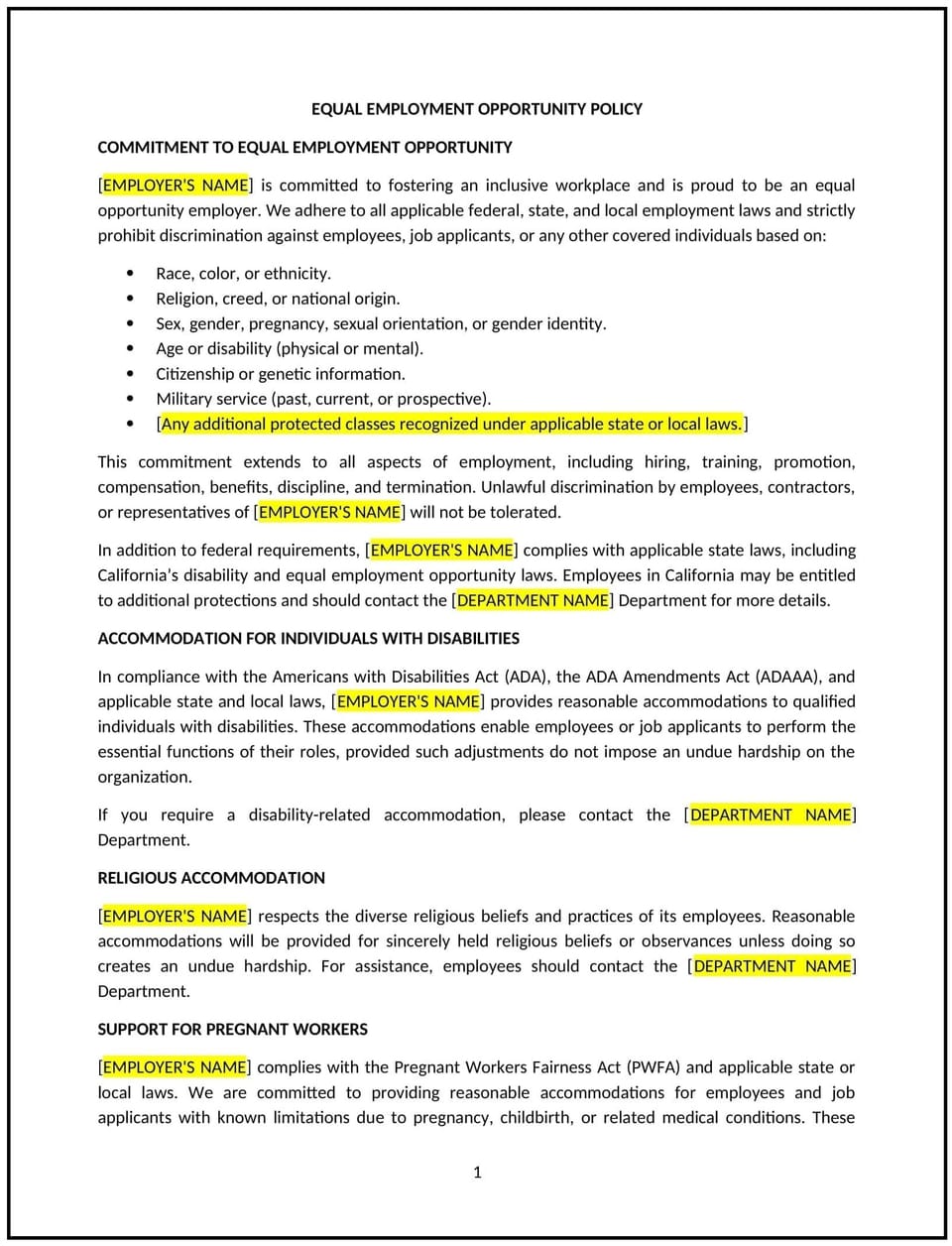Equal employment opportunity policy (California): Free template

Equal employment opportunity policy (California)
In California, an equal employment opportunity (EEO) policy provides businesses with guidelines to promote a workplace free from discrimination, harassment, and retaliation. This policy supports compliance with California laws, such as the Fair Employment and Housing Act (FEHA), and ensures all employment decisions are based on qualifications and merit.
This policy outlines the business’s commitment to EEO principles, employee rights, and procedures for addressing violations. By implementing this policy, California businesses can foster inclusivity, mitigate risks, and enhance employee trust.
How to use this equal employment opportunity policy (California)
- Define EEO principles: Clearly state the business’s commitment to non-discrimination, including protections for characteristics such as race, gender, disability, and sexual orientation.
- Outline prohibited conduct: Specify behaviors that violate EEO standards, such as discriminatory hiring practices or workplace harassment.
- Provide reporting channels: Offer employees clear procedures for reporting EEO violations, including confidential and non-retaliatory options.
- Address compliance measures: Detail steps the business will take to monitor compliance with EEO laws and provide training.
- Communicate enforcement: Ensure employees understand the consequences of violating EEO principles, such as disciplinary action.
Benefits of using this equal employment opportunity policy (California)
This policy offers several advantages for California businesses:
- Supports compliance: Reflects California laws, including FEHA and the California Equal Pay Act, ensuring fair employment practices.
- Promotes inclusivity: Demonstrates the business’s commitment to fostering a diverse and equitable workplace.
- Reduces risks: Helps the business proactively address and resolve potential EEO violations, minimizing legal liabilities.
- Enhances trust: Builds employee confidence in the business’s commitment to fairness and equality.
- Encourages accountability: Provides a structured framework for addressing and preventing discriminatory practices.
Tips for using this equal employment opportunity policy (California)
- Address California-specific laws: Reflect protections under FEHA and other state-specific EEO regulations, such as salary history bans.
- Train employees: Provide regular EEO training to ensure all staff understand their rights and responsibilities under the policy.
- Monitor compliance: Conduct audits of hiring, promotion, and pay practices to identify and address disparities.
- Promote reporting: Encourage employees to report violations without fear of retaliation and provide accessible reporting channels.
- Review regularly: Update the policy to reflect changes in California laws, workforce demographics, or business practices.
Q: How does this policy benefit the business?
A: This policy supports compliance with California laws, promotes inclusivity, and fosters employee trust by ensuring fair treatment for all.
Q: What types of discrimination are prohibited under this policy?
A: The policy prohibits discrimination based on characteristics protected by California laws, including race, gender, age, disability, sexual orientation, and more.
Q: How does this policy support compliance with California laws?
A: The policy reflects FEHA and other state regulations, supporting lawful and equitable employment practices.
Q: What steps should employees take to report a violation?
A: Employees should use the reporting channels provided, such as contacting HR or filing a complaint through a confidential hotline.
Q: How can the business prevent EEO violations?
A: The business can provide regular training, monitor compliance, and enforce clear consequences for discriminatory or retaliatory behavior.
This article contains general legal information and does not contain legal advice. Cobrief is not a law firm or a substitute for an attorney or law firm. The law is complex and changes often. For legal advice, please ask a lawyer.


